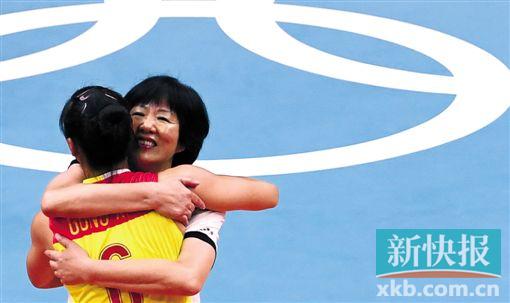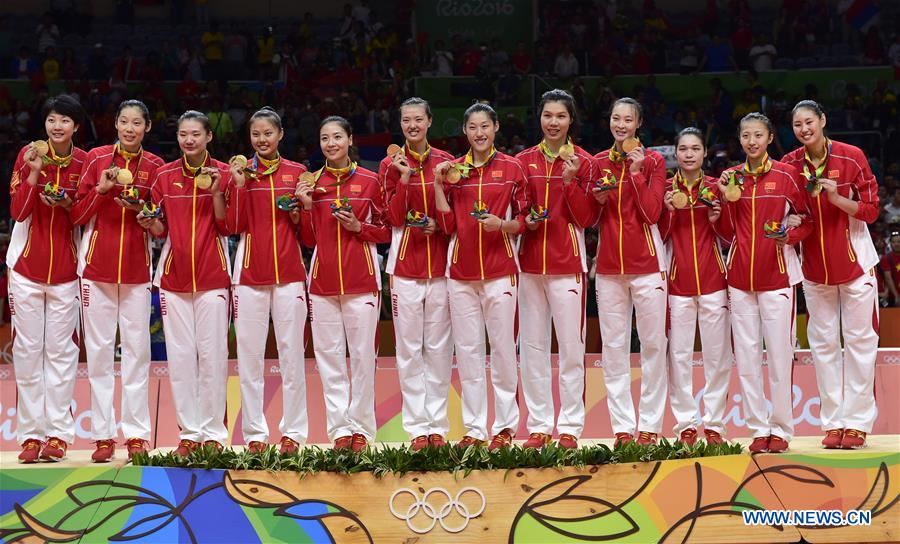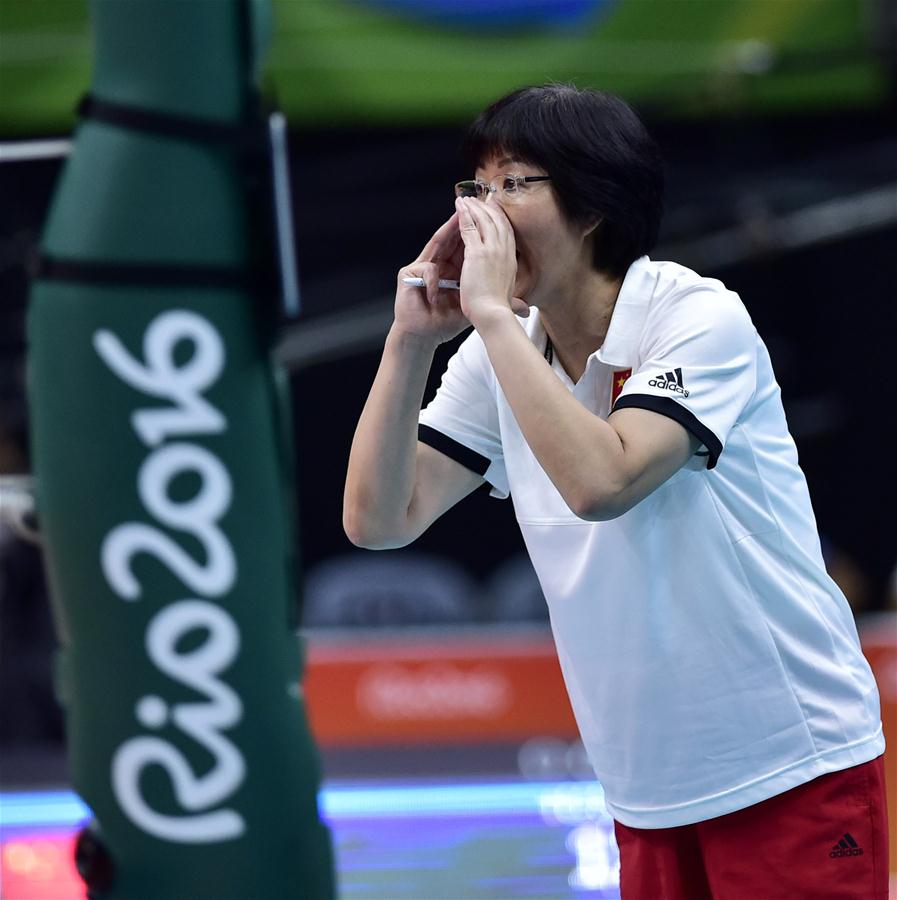


The Chinese people’s excitement over the 2016 Rio Olympics peaked on Saturday night after China beat Serbia in the women's volleyball final, winning its 26th gold medal.
China’s women’s volleyball players had every reason to shed tears of joy after pulling off a massive upset victory over Serbia. This year marks the third time that China has stood at the top of the podium in the history of volleyball at the Olympic Games. It has been 12 years since the last time that happened, at the Athens Olympics in 2004. The Chinese volleyball team won its first Olympic gold in Los Angeles in 1984, when Lang Ping, current head coach, was a player on the team.
The volleyball victory has been a cause for celebration and revelry for Chinese viewers all over the world. The percentage of the Chinese viewing audience that tuned in reached over 70 percent, according to data from China’s two live broadcasting TV channels, CCTV5 and CCTV 1. This rate is double that of the CCTV New Year's Gala, the most-watched CCTV program.
News of the victory was broadcast across China’s many news portals and quickly circulated via boisterous social media posts. Even China’s 30-minute primetime news program “Xinwenlianbo,” or “CCTV tonight,” spent a rare seven full minutes broadcasting news of the momentous match.
Netizens in China and overseas flocked to WeChat “moments” to share photos, videos and victorious emojis. One wrote: “I am not a volleyball fan, but I just burst into tears watching the exuberant audience at the stadium laughing and crying on TV. I am glad that I witnessed this historical moment with millions of Chinese. The word ‘excitement’ cannot sufficiently describe my feelings.”
“The moment when the volleyball touched the ground, I couldn’t help crying, joyfully and proudly,” said Irene, a 20-year-old Chinese student in California. “I was afraid that my heart might bounce out of my body during the game. It was too excited!”
Without question, the Olympic volleyball final stirred the hearts of many Chinese; the game simply had a kind of magic.
But why?
A “ legendary” collective memory
The Chinese women's volleyball team climbed to the top podium during five consecutive World Championships, World Cups and Olympics from 1981 to 1986, not long after China initiated its reform and opening. The 1980s were an era of confusion, conflicts and obscurity; however, the rise of the Chinese women’s volleyball team injected courage, strength and unyielding spirits into a vulnerable society.
After the squad’s victory in 1981, People’s Daily published a commentary titled “Learn from women’s volleyball, rejuvenate China——China won.” It was a win not just for the team, but for the whole country and an entire generation.
If table tennis set the stage for China’s international diplomacy, then volleyball rebuilt the nation’s confidence. Students from Peking University and other schools popularized the slogan “Learn from women’s volleyball, rejuvenate China.” Soon, the “women’s volleyball spirit” was disseminated throughout the country as a model to be emulated by all trades and professions.
Throughout that era, the Chinese women’s volleyball team carried a whole nation’s dreams and expectations. These expectations were passed down and maintained even as the players changed, generation after generation of women’s volleyball greatness.

China's players attend the awarding ceremony for the women's final of Volleyball at the 2016 Rio Olympic Games in Rio de Janeiro, Brazil, on Aug. 20, 2016. China won the gold medal. (Xinhua/Yue Yuewei)
“Iron hammer” coach
Lang Ping boldly inked her name in volleyball history books by not only witnessing glories, but by creating legends. She was a member of the team that won the World Championship in 1982, as well as World Cup titles in 1981 and 1985. As a star striker, she led the national team to win gold against the United States at the 1984 Los Angeles Olympic Games, becoming a symbol of China’s international ascent.
Her precise and powerful spikes earned her the name “Iron Hammer.” After the 1984 Olympics, the image of her spike could be found on stamps, souvenirs and even utensils. In the same year, Lang Ping stood on the exclusively designed women’s volleyball float in the parade to celebrate the 35th anniversary of the founding of the People’s Republic of China. Since then, no other player has ever enjoyed such an honor.
After her retirement in 1986, Lang Ping eschewed the typical ex-athlete’s path of becoming an official in a Chinese sports department. Instead, she embarked on a less common career path, teaching and coaching volleyball.
Lang Ping was an assistant coach at the University of New Mexico from 1987 to 1989, and again from 1992 to 1993. In 1995, she became the head coach of the Chinese national team, eventually guiding the squad to win a silver medal at the 1996 Atlanta Olympic Games, as well as second place at the 1998 World Championships in Japan. She then resigned from the Chinese national team in 1998 due to health problems. The following year, she took a head coaching position with the Italian professional volleyball league, enjoying great success and winning league championships and coach of the year awards multiple times.
She became coach of the U.S. national team in 2005, guiding the players to a silver medal at the 2008 Olympics. In a moment of great controversy, Lang led the American team to beat China at the Beijing Olympics. Once an icon and a hero, she was now an opponent and competitor to her Chinese fans and supporters.
In 2016, Lang became the first person ever to win a gold medal as both a player and a coach at the Olympics.
"It's not important to me to make history," Lang said after the game. "I'm so happy for the girls. They trained very hard.”
Her charisma has won her many fans. One commentator noted that, within China’s sporting world, Lang Ping is the one name that can bridge the gap between generations, and that can resonate with the entire nation.

Lang Ping coaching the Chinese women's volleyball team at the Rio Olympics [Photo: Xinhua]
The spirit of Chinese women’s volleyball
“No matter whether I am coach or not, China’s ‘women’s volleyball spirit’ should be passed down from generation to generation,” said Lang Ping.
So what is that spirit? No one can explain it precisely, but when you watch a game, you see it.
When the Chinese team lost its Olympic opener in five sets to the Netherlands back on Aug. 6, Lang Ping challenged her players to learn from their mistakes, to support one another through the ups and downs, to grow from each defeat and to triumph on the pressure-packed Olympic stage. Days later, China took down the two-time defending Brazilian Olympic champions on their home turf in the quarterfinals, and then triumphed over the Netherlands in the semis. The team had its most shining moment after its victory over Serbia.
Serbia actually got off to a strong start in the final match. The Serbian team earned a 12:7 lead in the first set, forcing China to fight its way back with a victory in the second. China won a hard third set, but neither team took a lead of more than three points at any time.
Lang Ping proudly explained, “The Chinese women’s volleyball team spirit doesn’t lie in winning, but in never giving up even when it seems like you cannot win.”
 World's fastest bullet train to start operating next month
World's fastest bullet train to start operating next month Huangluo: China's 'long hair village'
Huangluo: China's 'long hair village' Spectacular bridge with one of the tallest piers in the world
Spectacular bridge with one of the tallest piers in the world Magnificent view of Hukou Waterfall
Magnificent view of Hukou Waterfall A glimpse of Stride 2016 Zhurihe B military drill
A glimpse of Stride 2016 Zhurihe B military drill US Navy chief tours Liaoning aircraft carrier
US Navy chief tours Liaoning aircraft carrier Chinese American woman wins Miss Michigan
Chinese American woman wins Miss Michigan Centenarian couple takes first wedding photos
Centenarian couple takes first wedding photos Traditional Tibetan costumes presented during fashion show
Traditional Tibetan costumes presented during fashion show Top 10 livable Chinese cities
Top 10 livable Chinese cities Top 20 hottest women in the world in 2014
Top 20 hottest women in the world in 2014 Top 10 hardest languages to learn
Top 10 hardest languages to learn China’s Top 10 Unique Bridges, Highways and Roads
China’s Top 10 Unique Bridges, Highways and Roads Pragmatism raises hope for Myitsone Dam
Pragmatism raises hope for Myitsone Dam Chinese Catholics split over cardinal’s article about China-Vatican negotiations
Chinese Catholics split over cardinal’s article about China-Vatican negotiations Helpful hacker forums close after arrest for revealing vulnerabilities
Helpful hacker forums close after arrest for revealing vulnerabilities 'Born in China' uses drama and cute animals to promote environmental message
'Born in China' uses drama and cute animals to promote environmental messageDay|Week